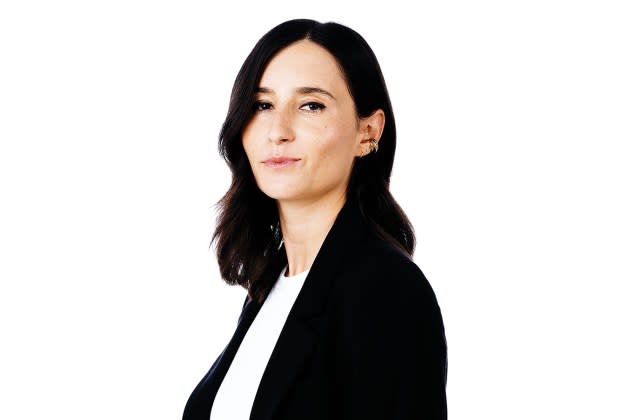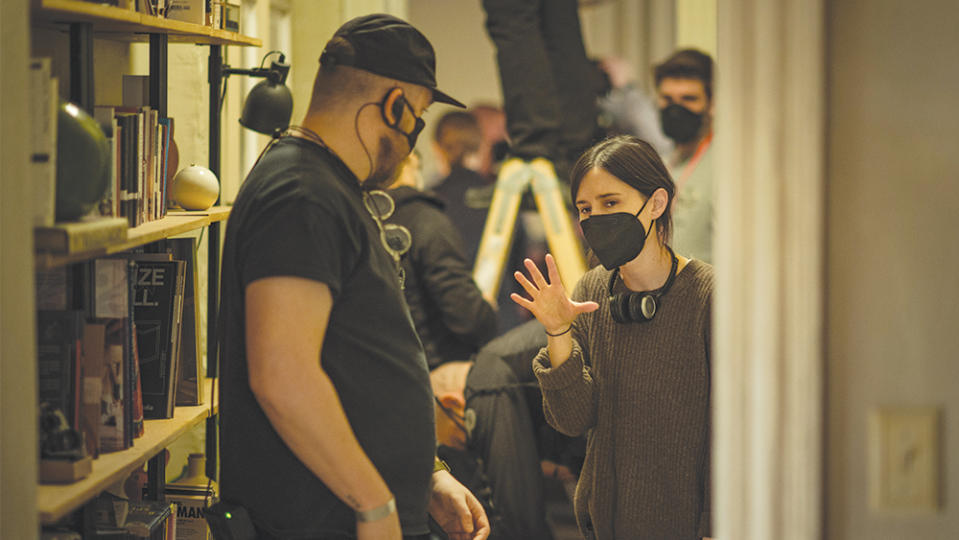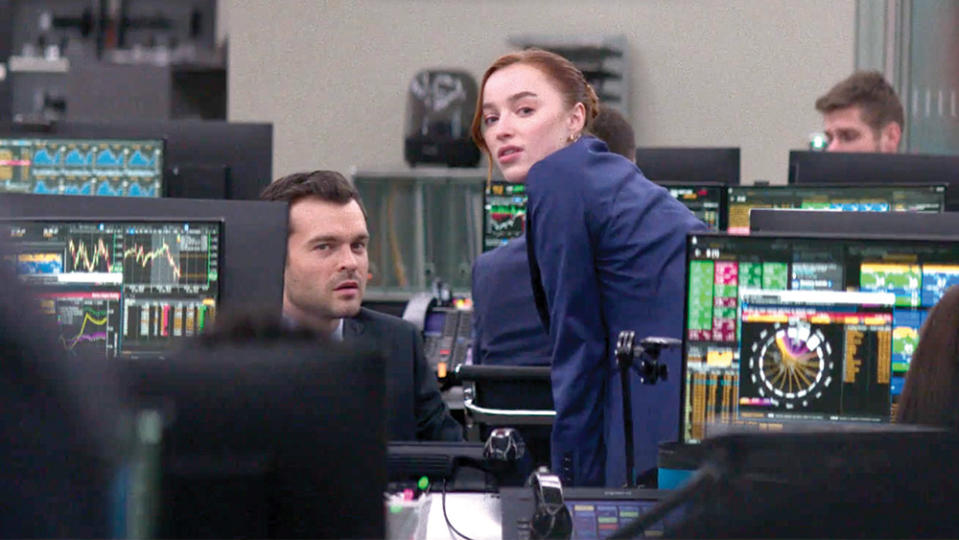With ‘Fair Play,’ Director Chloe Domont Creates the Kind of Steamy, Psycho-Sexual Thriller We Haven’t Seen Since the ’90s

When writer-director Chloe Domont sat behind an audience watching her debut film, ‘Fair Play,’ at the Sundance Film Festival in January, her eyes were locked on the 80-something-year-old man sitting in front of her. “There’s no way he’s the target audience,” she thought. “I hope I don’t give this man a heart attack.”
It’s not a crazy concern. The film’s opening sequence unfolds in the bathroom of a wedding as two guests sneak away to have sex, not realizing their mid-reception quickie will be grossly betrayed by a mess of menstrual blood. It’s funny, shocking and maybe a little terrifying to imagine the racy scene playing out in front of someone who could be your grandfather.
More from Variety
'Black Barbie' Documentary Acquired by Netflix and Shondaland
Netflix, EWA Network Launch Series Accelerator Program for Women Film Producers
'Fauda' Star Lior Raz Joins Israeli Rescue Mission to Save Two Families From Hamas Attacks
Phoebe Dynevor and Alden Ehrenreich star in “Fair Play,” a rare film with substance and style and wit to match the flash, about a young couple who keep their relationship secret because they work together at a rule-bound, cutthroat hedge fund run by a sociopathic boss (Eddie Marsan) and his cohort of toxic bros. The pressure cooker of a movie becomes increasingly tense after Emily (Dynevor) earns a lucrative promotion over Luke (Ehrenreich) and becomes his boss, causing them both to come quickly — and ultimately violently — undone.
As the theatergoers in Park City were witnessing the shifting power dynamic between Emily and Luke, Domont couldn’t keep her eyes off the old man, who was having the time of his life. “He was on the edge of his seat with his hands covering his mouth the whole time.”
The collective shrieks and audible gasps from inside the packed house at Sundance show the wide appeal of “Fair Play,” a wildly fun crowd-pleaser with an acid take on what it means to be a successful woman in 2023. Netflix was confident in its commercial prospects. After a heated bidding war, the movie sold to the streamer for a staggering $20 million, one of the biggest deals of this year’s festival.
“It was a magical 48 hours,” says Domont, 36, whose mild, almost demure manner belies her audacious style of filmmaking. “I killed myself to make this movie.”
The idea for “Fair Play” came to Domont when she was around 30, just after she began to establish herself in television, writing and directing episodes of HBO’s “Ballers,” the Showtime drama “Billions” and the USA Network’s “Suits.” These early achievements were professionally thrilling but romantically devastating.
“Men I was dating were threatened by me,” Domont says matter-of-factly. “It’s nothing that was ever spoken about; it was just this elephant in the room. Me being big made them feel small.”
It gnawed at her that her success didn’t feel like a win. “It felt like a loss,” she says. “On the surface, there was excitement from my male partners, but underneath that was insecurity.”
Domont came to the conclusion that ambitious women have to tiptoe around their accomplishments. So the first scene that came to her when she started writing “Fair Play” is the one where Emily apologizes after she breaks the news of her promotion to Luke, who up to now has been her biggest champion. He had thought the job was his. “She gets the thing she’s been working toward her whole life,” Domont says, “and she can’t even feel excited.”
Domont isn’t Emily, though they share a quiet confidence and competence. Neither is afraid to acknowledge her worth in male-dominated industries. Hollywood is like Wall Street in that it’s riddled with misogyny and that “greed is good” mentality. In both, Domont says, “the margin of error for women is small.”

But the filmmaker wasn’t interested in telling her own story exactly as she’d lived it. Though she “writes her fears,” she wanted to ramp them up to 11. “I like to make movies where people try to destroy each other,” Domont says with a grin. “It’s heartbreaking, but it’s fun.”
“Fair Play,” which opened in theaters on Sept. 29 before debuting on Netflix on Oct. 6, is bold in its assertions about sexual politics, and Domont wants those sentiments to make men uncomfortable. “The bottom line is we don’t know how to deal with sexual politics because we don’t even know how to talk about it,” she says.
Men need not be afraid of “Fair Play,” though — they’ll find it fun and smart too. But Domont is most interested in women’s feedback about the film. “The most powerful thing is hearing women say how seen they feel in a way they’ve never been seen before on-screen.
Domont didn’t have any connections in entertainment after graduating from NYU. Then a friend introduced her to Julian Farino, who’s directed episodes of HBO’s “Entourage” and “Ballers.” She called and begged him for a job. “I’ll get your coffee, deliver your dry cleaning, whatever you need,” she told him.
Farino hired Domont as an assistant on “Ballers.” “She was monumentally overqualified,” Farino says, “but she wasn’t too grand to take on that position in order to learn.”
More than Domont’s willingness to fetch espressos, Farino was impressed by her “intensity of purpose.” “I remember colleagues and I would go drinking on the Lower East Side, and quite often, she would be in the middle of writing something for herself and wouldn’t come.”
Domont hated that people thought of her as intense and ambitious. But these are traits she’s grown to love about herself. “I’ve always felt criticized for my inability to let things go,” she says, “but it has only served me in my career.”
Eventually Domont joined the writers’ room on “Ballers,” where creator Steven Levenson gave her her first big break behind the camera. Despite being responsible for a sizable budget and working with star Dwayne Johnson, Domont wasn’t intimidated. “I’ve always had a delusional confidence that served me quite well,” she says.
Working as writer and director gave Domont firsthand insight into the merciless nature of television, where episodes can get slashed and reshaped without warning. “I remember seeing the final thing, and was like, ‘Oh, they changed everything.’” But there was freedom in being able to relinquish control. “You cannot be precious about your work,” she says.

Then again, those old controlling habits die hard. “With TV, you’re there to serve someone else. My goal has always been to tell my own stories.”
So during the pandemic, Domont spent six months writing the script for “Fair Play.” Her agents shopped the screenplay around town, where it landed at “Knives Out” filmmaker Rian Johnson’s production company T-Street, which had started a joint venture with MRC to support emerging filmmakers. Johnson was hooked.
“There was such clarity in the storytelling,” he says. “It was immediately apparent this is somebody who knows how to grab you.”
Domont considers her unwavering vision her strength. As a film director, she is intensely involved with everything from lighting to camera angles to costumes. “Every choice has to be a choice. There has to be intention behind that choice,” she says. “If there isn’t, I think that’s a problem. Anything that’s on-screen, I don’t care if it’s moving in the background, there has to be a reason for it.”
One of the more unexpected choices had to do with the volume of bodily fluids in that initial bathroom rendezvous. “There was too much blood at one point,” Ehrenreich said in a conversation at Sundance, before the SAG strike. Dynevor added, “And then there wasn’t enough.”
“Blood continuity was a thing,” Domont says, laughing.
Domont wants to keep directing the kinds of stories that take viewers on wild rides. “I know the next four movies I want to make,” she says coyly. “All I can tell you is they are going to be batshit crazy.”
Tara Swennen/Falcon; Stylist Assistant: Alexa Molinario; Jacket: Halogen; Pants: Pinko; Top: JLUXLABEL
Best of Variety
Sign up for Variety’s Newsletter. For the latest news, follow us on Facebook, Twitter, and Instagram.

